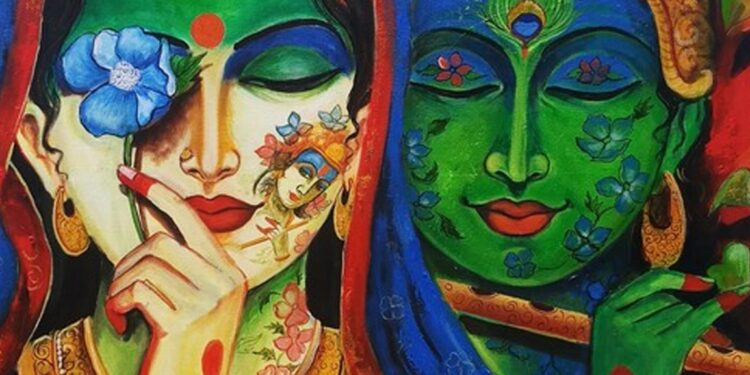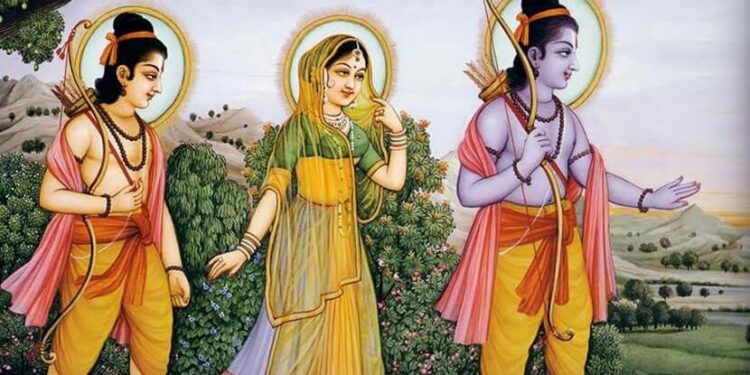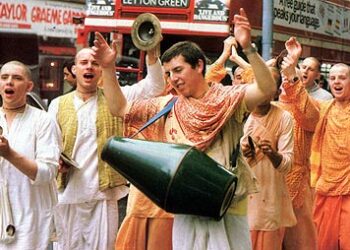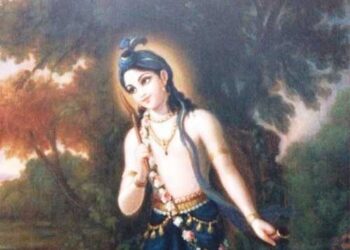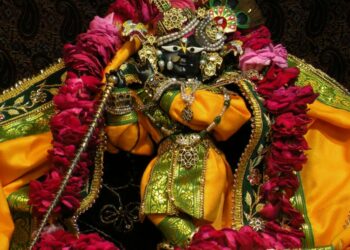by Hayagrīva dās Adhikārī
(lSKCON—New Vṛndāvana)
Lord Kṛṣṇa has innumerable expansions. As far as Kṛṣṇa Himself is concerned, there are six opulences which are always present—knowledge, wealth, fame, strength, beauty and renunciation. He has these opulences in totality, whereas created beings have them in part only.
Knowledge
In the world there have been men who have been considered very rich in knowledge—Socrates, Plato, Sir Isaac Newton, Galileo, Francis Bacon, Da Vinci, Einstein, etc. History has afforded us innumerable geniuses whose thoughts have profoundly affected human civilization and who have been considered very expert from the human point of view. But it is remarkable that in their own eyes they feel like dwarfs before the great storehouse of knowledge which governs nature. Isaac Newton used to consider himself to be no more than a little boy playing on the seashore and observing multicolored shells washed up on the beach. The shells were all he knew of what inhabited the inaccessible depths of that great ocean.
So no man can claim to have all knowledge. Even if a man has all knowledge about his particular field (indeed the more a man pursues a subject the more he realizes he knows nothing about it), he is still ignorant of other fields of knowledge. No one knows everything in this material world. Even the demigods, whose knowledge is fantastic from the human point of view have limited knowledge. Lord Brahmā, for instance, creates this universe and so thoroughly knows every object in it, but when he rose out of the lotus flower springing from the navel of the Mahā-Viṣṇu, he looked about in total confusion and began to meditate to find out what he was, where he was, and why he was. So even his knowledge is limited. Lord Kṛṣṇa says, “Neither the hosts of demigods nor the great sages know My origin, for, in every respect, I am the source of the demigods and sages.” (Gītā, 10.2)
It is only Kṛṣṇa, the Supreme Lord, who has total knowledge of everything. He is the Self seated in the hearts of all. He is in the heart of the great Brahmā and in the heart of the tiny atom. “O scion of Bharata, you should understand that I am also the knower in all bodies; and to understand this body and its owner is called knowledge; that is My opinion.” (Gītā, 13.2) The living entity is the knower of his particular body, but Lord Kṛṣṇa is the supreme knower, proprietor and dweller in all bodies. Therefore, He is the super knower, the omniscient, the embodiment of total knowledge. He is both the knower and that which is to be known. He is addressed by Arjuna: “Knowing everything, You are all that is knowable.” (Gītā, 11.38)
Wealth
There have been fabulously wealthy men in history and wealthy empires, but from the point of view of Kṛṣṇa the total wealth of the earth is insignificant. The earth is merely one planet in a solar system, which is but one of sextillions of solar systems in the universe, which is only one of countless universes in the material creation, which is only a tiny cloudy spot in the all-pervading brahma-jyoti in which there are countless spiritual planets. And this brahma-jyoti is emanating from the body of Kṛṣṇa. This effulgence is simply a by-product and is in no way His real opulence. So the wealth of the Supreme Godhead defies the imagination. Arjuna saw everything concentrated in His body on the battlefield. “Whatever you want to see, you can see in this body all at once,” Kṛṣṇa told him. (Gītā, 6.7) Total wealth then means that He contains and owns everything.
Fame
All the demigods who are in charge of the various universes know and worship Kṛṣṇa. Being the supreme omnipresence, He is known and extolled in all the three worlds. Though it may appear that some planets are ignorant of Him due to the influences of the age of Kali, His fame is total, and His countless names are chanted in all spheres.
The fame of any man or nation is temporary or illusory. Today we have completely forgotten the nations that dwelled on this earth only six thousand years ago, and because we have forgotten them, we claim that no civilizations were existing then, although man is known to have been walking upright on this planet for at least a million years. Yet man’s vanity would have him think that his fame is eternal.
Like the other opulences, fame is incidental to Kṛṣṇa. In the Vaikuṇṭha planets hundreds of millions of Lakṣmīs serve at His feet. “I worship Govinda, the primeval Lord, the first progenitor, who is tending the cows, yielding all desire, who dwells in abodes built with spiritual gems, surrounded by millions of purpose-trees, and who is always served with great reverence and affection by hundreds of thousands of Lakṣmīs or gopīs.” (Brahma-saṁhitā, 5.29) Lord Kṛṣṇa is the totality of everything. He is known in all the worlds, and so has total fame.
Strength
The average man has hardly the strength to lift his own weight. And at most his intelligence has only enabled him to detonate a hydrogen bomb which is not even able to destroy the earth. The strength of one who is able to lift all the worlds out of the Causal Oeean and drain that ocean itself is inconceivable. Upon seeing the splendor of the Lord’s universal form, Arjuna extolls His might: “O great one, who stands above even Brahmā, You are the original master. Why should they not offer their homage up to You, O limitless one, O refuge of the universe? You are the invincible source, the cause of all causes, transcendental to this material manifestation … O limitless form, this whole cosmic manifestation has come from You … I offer my respects from the front, from behind and from all sides. O unbounded power, You are the master of limitless might!” (Gītā, 11.37, 38, 40)
In Śrīmad-Bhāgavatam there are innumerable accounts of Lord Kṛṣṇa’s battles with great demons which celebrate the strength of the Lord. It is always notable that after playing with the demons for a while, He kills them easily in an off-handed manner. There are demigods whose strength is unlimited from the human point of view, but the strength and power of the demigods are insignificant compared to Kṛṣṇa’s. After giving a brief account of some of His opulences in the Tenth Chapter of the Gītā, Kṛṣṇa says, “But what need is there, Arjuna, for all this detailed knowledge? With a single fragment of Myself I pervade and support these entire universes.” (Gītā, 10.42)
So the Supreme Lord is asamardha, which means that no one is greater than Him because no creature can move without His aid, for He is the prime mover. “Furthermore, O Arjuna, I am the generating seed of all existences. There is no being—moving or unmoving—that can exist without Me.” (Gītā, 10.39) Being the strength in all beings, He is therefore the embodiment of total strength.
Beauty
The absolute beauty of Kṛṣṇa is sung in praises by great sages who incarnate themselves as cowherd girls (gopīs) in order to enjoy loving exchanges with Him. His supreme original form, as exhibited in the forests of Vṛndāvana, is that of a youth of around sixteen years of age. He descended on earth as the embodiment of love, all spiritual in essence, and He attracts men, women, and all that move and move not. He comes with laughter and with loving glances, and He wears brilliant yellow cloth and garlands and plays His flute. In the forests of Vṛndāvana He sports with the cowherd girls, the gopīs, who worship Him with the holy sentiment of transcendental love. Since He is love incarnate, He enchants even the heart of the God Nārāyaṇa, and the divine Lakṣmī transformed herself into the hairs on His chest so that she can always be near His heart.
It is stated in the Caitanya-caritāmṛta that Kṛṣṇa is so supremely lovely that He attracts Himself and even desires to embrace His own form. Upon seeing the beauty of His fresh, youthful, brightly shining limbs reflected upon a pillar of pearls, He yearned for Himself like Rādhā. “I bestow joy to all,” He says, “but who can bestow joy upon Me?” His love’s power instills joy, and Rādhā is the essence of this love.
The body of Kṛṣṇa is the figure of beauty itself. It is tinged with color of blue clouds. The bottoms of His hands and feet are pink. His torso is bare, but from His neck hangs a garland of flowers, beautified with a locket in the shape of the moon. From His waist a cloth of dazzling gold hangs in folds. His flowing black hair reaches His shoulders. He wears a golden, bejeweled crown topped by peacock feathers. His eyes are as large as the petals of a full blown lotus, and His hands and lips play lightly upon a flute. Being the embodiment of supreme absolute beauty, He is ultimate majesty and beauty, perfect in every respect. His eternal form is incomparable and is worshiped throughout the creation. His very name, Kṛṣṇa, means He who attracts everyone.
In Lord Caitanya, a play written by this author and based on the Caitanya-caritāmṛta, Lord Caitanya praises the beauty of the Lord in this way: “His beauty is an ocean of nectar whose waves flood the arid hills of the soul. His words delight the ear. His arms and legs surpass the coolness of a thousand moons. Oh, His beauty enchants my senses so! How sweet the fragrance of His lips! My five senses ride my mind like a horse and drive the mind at once five different ways. And He dances through my mind, and my mind, overjoyed, responds to Him, His speech, His touch, and my mind is ridden to madness, death. Yet I cannot blame my senses, for the Lord attracts them so. Oh, the waves of His beauty cover the mountains of my yearning soul! His speech ravishes my ears with mischief, and His touch, O His touch is cool, and His limbs, so fragrant, soft, strong, intoxicating, surpass the color of the blue lotus. His lips mixed with the sweet camphor of His smile grow sweeter. His color is sweeter than the nimbus, and His cloth brighter than lightning. What autumnal moon compares to His face covered with locks of hair? Rainbows of peacock feathers crown His head, and stars wreath His neck like pearls. Oh, the Lord kills the gopīs with love. His chest is broad and high, and small hairs adorn it. These hairs are Goddess Lakṣmī who transformed herself to dwell always on His breast. And this breast is a robber who steals a trillion hearts. Oh, He enchants the gopīs with shining cheeks and crocodile shaped rings hanging from His ears and His sharp side glances full of smiles. Yes, He is a clever hunter and they His prey whom He kills at will. And His arms are soft but strong and lethal as blue cobras, for they pry open the doors of the soul and inject the painful venom of love. Even the god of love now pines for Him.”
In the Bhagavad-gītā Arjuna tells Kṛṣṇa, “You are the unborn and all pervading beauty.” (Gītā, 10.12) Therefore, all beauty that is seen in the material world is but a reflection of that absolute beauty existing in Kṛṣṇa.
In the Tenth Chapter of the Gītā, Arjuna says that “neither the gods nor demons, O Lord, know Thy personality. Indeed You alone know Yourself by Your potencies.” (Gītā, 10.14, 15) He then requests Kṛṣṇa to tell him in detail of His divine powers by which He pervades all the worlds and abides in them. Lord Kṛṣṇa replies, “Yes I will tell you of My splendorous manifestations; but only of those which are prominent, O Arjuna, for My opulence is limitless.” (Gītā, 10.19) Lord Kṛṣṇa then proclaims that He is the self seated in the hearts of all and is the beginning, middle and end of all creatures. After establishing this, He begins to enumerate specific incarnations and phenomena which is He Himself. He mentions demigods, animals and natural wonders like the Himālayan Mountains and the Ganges. Among all living entities in the world, He is the greatest. He is wind, death, fire, unexhaustible time, the spiritual science of the self, the flower-bearing spring, splendor, victory and adventure, the generating seed of all existences, the rod of chastisement, statesmanship, silence, wisdom, the holy fig tree, the ocean, the thunderbolt, the monarch among men, the greatest among elephants and serpents and other animals, and so on. At the conclusion of this brief account of some of His opulences, He says, “O mighty conquerer of enemies, there is no end to My divine manifestations. What I have spoken to you is but a mere indication of My infinite opulences. Know that all beautiful, glorious and mighty creations spring from but a spark of My splendor.” (Gītā, 10.40-42)
Renunciation
The sixth opulence of Kṛṣṇa is perhaps the most awe inspiring. It is renunciation—the opulence by which the Lord can reject all others. “There is nothing whatever that is higher than I. Everything rests upon Me as pearls are strung on a thread.” (Gītā, 7.7) And like a string of pearls, all of Kṛṣṇa’s opulences can be taken off and thrown away while Kṛṣṇa remains complete in Himself. Lord Kṛṣṇa is much more than the sum total of His creation. “In My transcendental form I pervade all this creation. All things are resting in Me, but I am not in them. Yet, everything that is created does not rest on Me. Behold My mystic opulence. Although I am the maintainer of all living entities and although I am everywhere, still My self is the very source of creation.” (Gītā, 9.4,5)
Being the embodiment of perfect renunciation, as taught in the Gītā, Lord Kṛṣṇa creates everything in a spirit of detachment. “The whole cosmic order is under Me. By My will is it manifested again and again, and by My will is it annihilated in the end. O Dhanañjaya, all this work cannot bind Me. I am ever unattached, seated as though neutral.” (Gītā, 9.8, 9) Also in the Fourth Chapter Lord Kṛṣṇa says that works do not defile Him because although He creates everything, He has no yearning for the fruits of His creation. One who knows the nature of His creation and of His renunciation is not bound by works.
The hand of the Lord is in every sphere of activity, yet He remains neutral. In the Brahma-saṁhitā it is said, “The lord of Gokula is the transcendental Supreme Godhead, the own self of eternal ecstacies. He is the superior of all superiors and is busily engaged in the enjoyments of the transcendental realm and has no association with His mundant potency.” (Brahma-saṁhitā, 5.6) The material nature, which is a perverted reflection of the spiritual potency, is located on the other side of the river Virajā which surrounds the Brahman-dhāma which is the boundary of Mahā-vaikuṇṭha. It is said that material nature is actually ashamed to appear before Lord Kṛṣṇa, and when He wishes to create through material nature He does not mingle with her but simply glances her way. “Kṛṣṇa never consorts with His illusory energy. Still her connection is not entirely cut off from the absolute truth. When He intends to create the material world, the amorous pastimes in which He engages by consorting with His own spiritual (cit) potency, Ramā, by casting His glance at the deluded energy in the shape of sending His time-energy, is an auxiliary activity.” (Brahma-saṁhitā, 5.7) Therefore the material creation has only indirect contact with Kṛṣṇa. It is the cit potency that carries His glance to the inferior energy. Lord Kṛṣṇa is therefore complete within Himself. All of His opulences can be renounced totally at any moment, and in no way by such renunciation is He any the less. This is the meaning of total renunciation.
Simply by studying the opulences of Kṛṣṇa one can become a mahātmā, a great soul. These opulences are described in detail in the various Vedic literatures—in the Gītā, the Śrīmad-Bhāgavatam, Caitanya-caritāmṛta, Brahma-saṁhitā and so on. The results of such studies are quickly perceived. One immediately comes to understand that Kṛṣṇa is the factual proprietor of everything and that the highest benefit derived is love for Kṛṣṇa Himself. “He who knows in truth this glory and power of mine engages in unalloyed devotional service. Of this there is no doubt. I am the Source of everything; from Me the entire creation flows. Knowing this, the wise worship Me with all their hearts.” (Gītā, 10.7, 8)
Understanding how things exist as separate from Kṛṣṇa is of no value. The knowledge, wealth, fame, strength, beauty and renunciation of a man who is unaware of Kṛṣṇa are worthless. One must come to understand that all these things exist in the Supreme Lord and that they are His gratuitous opulences. By studying the opulences of Kṛṣṇa we can come to understand why He is worthy of our worship. We may adore the beauty, wealth, fame, knowledge, strength or renunciation of a person, but when we come to understand that these are only fragmental and that Kṛṣṇa is the source of all of them, then we direct our adoration to Kṛṣṇa. Thus our thoughts should always dwell in Kṛṣṇa. We can become completely satisfied only by thinking of Him, surrendering our lives to Him and speaking of nothing but Him. “The thoughts of the wise men dwell in Me. Their lives are surrendered unto Me, and they derive great satisfaction and bliss enlightening one another and conversing about Me.” (Gītā, 10.9) The wise are always so engaged because Kṛṣṇa is their all in all. Therefore the truly wise are the most opulent, for they belong to Kṛṣṇa and Kṛṣṇa belongs to them.


